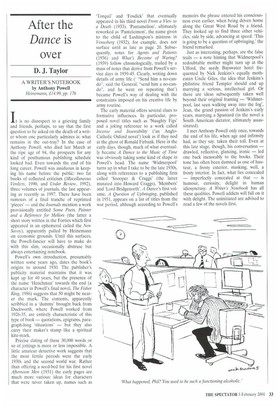After the
Dance is
over
D. J. Taylor
A WRITER'S NOTEBOOK by Anthony Powell Heinemann, £14.99, pp. 176 It is no disrespect to a grieving family and friends, perhaps, to say that the first question to be asked on the death of a writer whom one particularly admires is: what remains in the out-tray? In the case of Anthony Powell, who died last March at the ripe age of 94, the prospects for any kind of posthumous publishing schedule looked bad. Even towards the end of his long career. Powell was assiduous in keeping his name before the public: two fat books of collected criticism (Miscellaneous Verdicts, 1990, and Under Review, 1992), three volumes of journals, the last appearing as recently as 1997. There have been rumours of a final tranche of reprinted 'pieces' — and the Journals mention a work provisionally entitled Some Poets, Painter and a Reference for Mellors (the latter a short story written in the Forties which first appeared in an ephemeral called the New Savoy), apparently pulled by Heinemann on economic grounds. Until this surfaces, the Powell-fancier will have to make do with this slim, occasionally abstruse but always entertaining notebook.
Powell's own introduction, presumably written some years ago, dates the book's origins to around 1930. The publisher's publicity material maintains that it was kept up for 40 years, but the presence of the name 'Henchman' towards the end (a character in Powell's final novel, The Fisher King, 1986) suggests that 50 might be nearer the mark. The contents, apparently scribbled in a 'dummy' brought back from Duckworth, where Powell worked from 1926-35, are entirely characteristic of this type of book — quotations, epigrams, paragraph-long 'situations' — but they also carry their maker's stamp like a spiritual kite-mark.
Precise dating of these 30,000 words or so of jottings is more or less impossible. A little amateur detective work suggests that the most fertile periods were the early 1930s and the second world war. Rather than offering a seed-bed for his first novel Afternoon Men (1931) the early pages are much more various: ideas for characters that were never taken up, names such as `Torquir and 'Fosdick' that eventually appeared in his third novel From a View to a Death (1933). `Pantamelion', ultimately reworked as Panteleimon', the name given to the child of Lushington's mistress in Venusberg (1932), for example, does not surface until as late as page 20. Subsequently, notes for Agents and Patients (1936) and What's Become of Waring? (1939) follow chronologically, trailed by a mass of notes that derive from Powell's service days in 1939-45. Clearly, writing down details of army life (' "Send him a no-cando", said the General, "send him a no-undo", and he went on repeating that') became Powell's way of dealing with the constraints imposed on his creative life by army routine.
The early material offers several clues to formative influences. In particular, proposed novel titles such as 'Naughty Figs' and a joking reference to a work called Incense and Insensibility Can AngloCatholic Oxford novel') look as if they nod at the ghost of Ronald Firbank, Here in the early days, though, much of what eventually became A Dance to the Music of Time was obviously taking some kind of shape in Powell's head. The name 'Widmerpool' turns up in what I take to be the late 1930s, along with references to a publishing firm called 'Snooper & Craggs' (the latter mutated into Howard Craggs), 'Members' and 'Lord Bridgenorth'. A Dance's first volume, A Question of Upbringing, published in 1951, appears on a list of titles from the war period, although according to Powell's
memoirs the phrase entered his consciousness even earlier, when being driven home along the Great West Road by a friend. They looked up to find three other vehicles, side by side, advancing at speed. 'This is going to be a question of upbringing,' the friend remarked.
Just as interesting, perhaps, are the false trails — a note hinting that Widmerpool's redoubtable mother might turn up at the Ufford, the seedy Bayswater hotel frequented by Nick Jenkins's equally motheaten Uncle Giles, the idea that Jenkins's philistine friend Templer should end up marrying a serious, intellectual girl. Or there are ideas subsequently taken well beyond their original framing — 'Widmerpool, last seen walking away into the fog', Jean, the grand passion of Jenkins's early years, marrying a Spaniard (in the novel a South American dictator, ultimately assassinated).
I met Anthony Powell only once, towards the end of his life, when age and infirmity had, as they say, taken their toll. Even at this late stage, though, his conversation — drawled, reflective, glancing, ironic — led one back inexorably to the books. Their tone has often been damned as one of hauteur, a frosty exterior, masking, well, a frosty interior. In fact, what lies concealed — imperfectly concealed at that — is humour, curiosity, delight in human idiosyncrasy. A Writer's Notebook has all these qualities. Powell addicts will fall on it with delight. The uninitiated are advised to read a few of the novels first.


























































 Previous page
Previous page